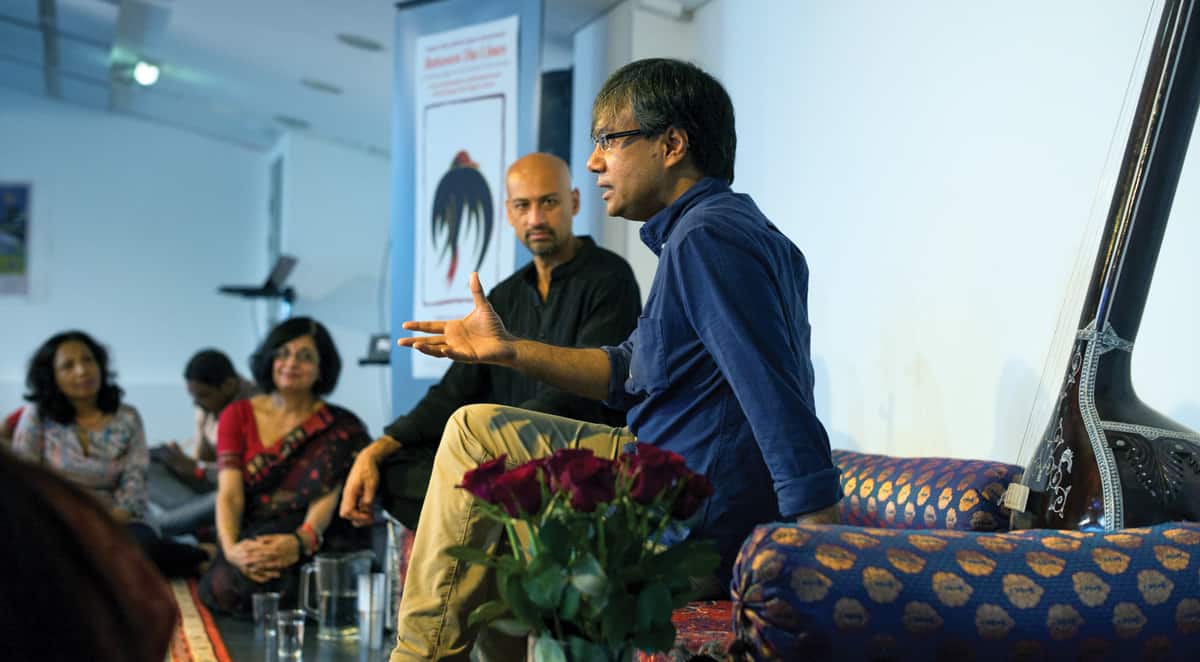Writer and musician Amit Chaudhuri had been commissioned to write the libretto for Sukanya shortly before Ravi Shankar died. He talked to Ken Hunt about how he responded to the story and the freedom that David Murphy gave him.
Speaking about the tale behind Sukanya, its librettist Amit Chaudhuri says: “I personally didn’t know the story. David Murphy sent me an account of the story. It was a very basic text. I had no idea of this story. I familiarised myself with it and then began to think about how to approach it. Later on, he sent me a comic book which Ravi Shankar’s wife Sukanya had passed on to him. It’s a comic book in a series which used to come out in India in various languages, including English, called Amar Chitra Katha which means ‘Immortal Picture Stories’. It’s a bit like the American Classics Illustrated.”
“…a comic book helped winnow Sukanya’s wheat from the chaff.”
As Wendy Doniger O’Flaherty wrote way back in 1988, they were “ostensibly written for children, but many adults read them.” Both series were conceived to have an educational and improving function. In the case of the Amar Chitra Katha comics, compounding that there was a political agenda. They were further intended to be a counterbalance to the weight of non-Indian, Western history and culture still taught in post-Partition schools. Using an eye-catching, brightly-coloured comic book form, they contained simplified, pared-down narratives about religious, historical or legendary characters, examples of which were Krishna, the Mughal court musician Tansen, the Bengali man of letters Rabindranath Tagore and Jawaharlal Nehru. Others condensed epic, drama or verse-narrative from the likes of Kālidāsa into digestible, bite-size fare. The Sukanya volume Chaudhuri received also distilled the tale to its essence. Something to applaud, a comic book helped winnow Sukanya’s wheat from the chaff.
“…a modern Indian tradition which has tried to be experimental…”
“I wanted to avoid,” he says, “an easy sort of perversion of Indian mythology which would have been very burdensome for me. I was working in an Indian tradition, a modern Indian tradition which has tried to be experimental in its standard approach. Ravi Shankar was one of the experimenters who didn’t take Indian classical music as some sacred given but reshaped it. His contemporaries also reshaped Indian classical music. I was happy to rethink how to tell this story and avoid the burden of producing something that looked quintessentially like an Indian mythological tale or whatever.”
What Amit Chaudhuri brings to the Sukanya libretto table is – and once was – his and his alone. Born in Calcutta in 1962, raised in Bombay, a survivor of the English educational system with a doctoral dissertation at Balliol College, Oxford on the poetry of D.H. Lawrence (and further trailing clouds of glory), he is also musically literate, having studied and made music with Hindustani classical and fusion slants. As librettist, when it came to writing the words for Sukanya, the breathing space of the sometimes-called monastic isolation of the mind paid dividends.
“…I was allowing this web of associations to take shape in my head.”
“I thought about the libretto for a long time. I thought about the associations in the story and the associations it set up in my head that would allow me to translate those situations into the libretto through a collage of already-existing texts. So, I’m quoting from Tagore, from Kālidāsa, from Eliot’s The Waste Land, from Walter Benjamin. But I do so very unobtrusively because it’s all happening without necessarily being flagged up. Once it’s flagged up, you will see what’s going on. As I thought about the story, I was allowing this web of associations to take shape in my head. Once I did that, over some months or maybe even a year, then I think I wrote it quite soon. I must have written it in a couple of months.
“There were certain things one focused on. Like the image of the sage covered in an ant heap. He’d been so immersed in his meditation for such a long time that, in effect, he’d become a kind of anthill. That idea of an old man quickened by love suddenly and unexpectedly is about what love can do even in old age. I took notice of that as something that was worth investigating.”
“…an old man quickened by love suddenly and unexpectedly…”
He takes a breath. “I was quoting from a variety of authors. I even quoted from myself. I quoted a section from my second novel Afternoon Raag [‘…the account of a young Bengali man who is studying at Oxford University’]. It’s a section about teaching somebody a rāg and teaching them how to tune the tanpura. I used that bit. David Murphy set that to music and said that fitted perfectly with the kind of music that he had from Ravi Shankar. He gave me a huge amount of freedom, I have to say, to imagine and write a libretto as I wanted to do. When I told him this was going to be my approach [Murphy] wasn’t alarmed at all.”
And, for the record: “I was supposed to meet [Shankar] after I was commissioned to do the libretto. I was supposed to spend some time with him in San Francisco, but then he passed on. Alas, I never met him.”
With thanks to Oliver Craske.
